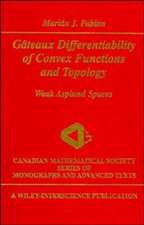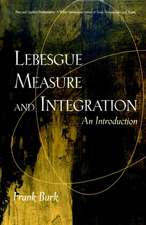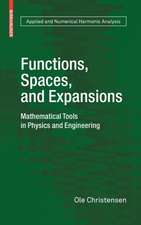Multivariable Analysis
Autor Satish Shirali, Harkrishan Lal Vasudevaen Limba Engleză Paperback – 20 dec 2010
Preț: 476.45 lei
Preț vechi: 560.52 lei
-15% Nou
Puncte Express: 715
Preț estimativ în valută:
91.17€ • 94.20$ • 75.84£
91.17€ • 94.20$ • 75.84£
Carte tipărită la comandă
Livrare economică 20 martie-03 aprilie
Preluare comenzi: 021 569.72.76
Specificații
ISBN-13: 9780857291912
ISBN-10: 0857291912
Pagini: 394
Ilustrații: X, 394 p. 18 illus.
Dimensiuni: 155 x 235 x 21 mm
Greutate: 0.57 kg
Ediția:2011
Editura: SPRINGER LONDON
Colecția Springer
Locul publicării:London, United Kingdom
ISBN-10: 0857291912
Pagini: 394
Ilustrații: X, 394 p. 18 illus.
Dimensiuni: 155 x 235 x 21 mm
Greutate: 0.57 kg
Ediția:2011
Editura: SPRINGER LONDON
Colecția Springer
Locul publicării:London, United Kingdom
Public țintă
Upper undergraduateCuprins
Preliminaries.- Functions between Euclidean Spaces.- Differentiation.- Inverse and Implicit Function Theorems.- Extrema.- Riemann Integration in Euclidean Space.- The General Stokes Theorem.- Solutions.
Recenzii
From the reviews:
“This is a textbook for a rigorous multivariable analysis course, intended for an undergraduate audience of juniors and seniors … . The book also includes some material not easily found in the existing literature. … also contains detailed solutions to many of its exercise; in fact, almost one-quarter of the book is devoted to solutions. … the book very attractive to people interested in self-study, as well as to instructors using different books who are looking for a source of additional problems for their classes.” (Mark Hunacek, The Mathematical Association of America, November, 2011)
“This is a textbook for a rigorous multivariable analysis course, intended for an undergraduate audience of juniors and seniors … . The book also includes some material not easily found in the existing literature. … also contains detailed solutions to many of its exercise; in fact, almost one-quarter of the book is devoted to solutions. … the book very attractive to people interested in self-study, as well as to instructors using different books who are looking for a source of additional problems for their classes.” (Mark Hunacek, The Mathematical Association of America, November, 2011)
Textul de pe ultima copertă
This book provides a rigorous treatment of multivariable differential and integral calculus. Inverse and implicit function theorems based on total derivatives are given and the connection with solving systems of equations is included. There is an extensive treatment of extrema, including constrained extrema and Lagrange multipliers, covering both first order necessary conditions and second order sufficient conditions. The material on Riemann integration in n dimensions, being delicate by its very nature, is discussed in detail. Differential forms and the general Stokes' Theorem are explained in the last chapter.
With a focus on clarity rather than brevity, this text gives clear motivation, definitions and examples with transparent proofs. Some of the material included is difficult to find in most texts, for example, double sequences in Chapter 2, Schwarz’ Theorem in Chapter 3 and sufficient conditions for constrained extrema in Chapter 5. A wide selection of problems, ranging from simple to challenging, is included with carefully written solutions. Ideal as a classroom text or a self study resource for students, this book will appeal to higher level undergraduates in Mathematics.
With a focus on clarity rather than brevity, this text gives clear motivation, definitions and examples with transparent proofs. Some of the material included is difficult to find in most texts, for example, double sequences in Chapter 2, Schwarz’ Theorem in Chapter 3 and sufficient conditions for constrained extrema in Chapter 5. A wide selection of problems, ranging from simple to challenging, is included with carefully written solutions. Ideal as a classroom text or a self study resource for students, this book will appeal to higher level undergraduates in Mathematics.
Caracteristici
Contains a number of examples as well as section-by section problems, ranging from simple to complex Problems illustrate the application of concepts introduced as well as further developments Extensive hints and solutions are provided Full chapter on extrema, including examples when the Lagrange method appears to "fail"















